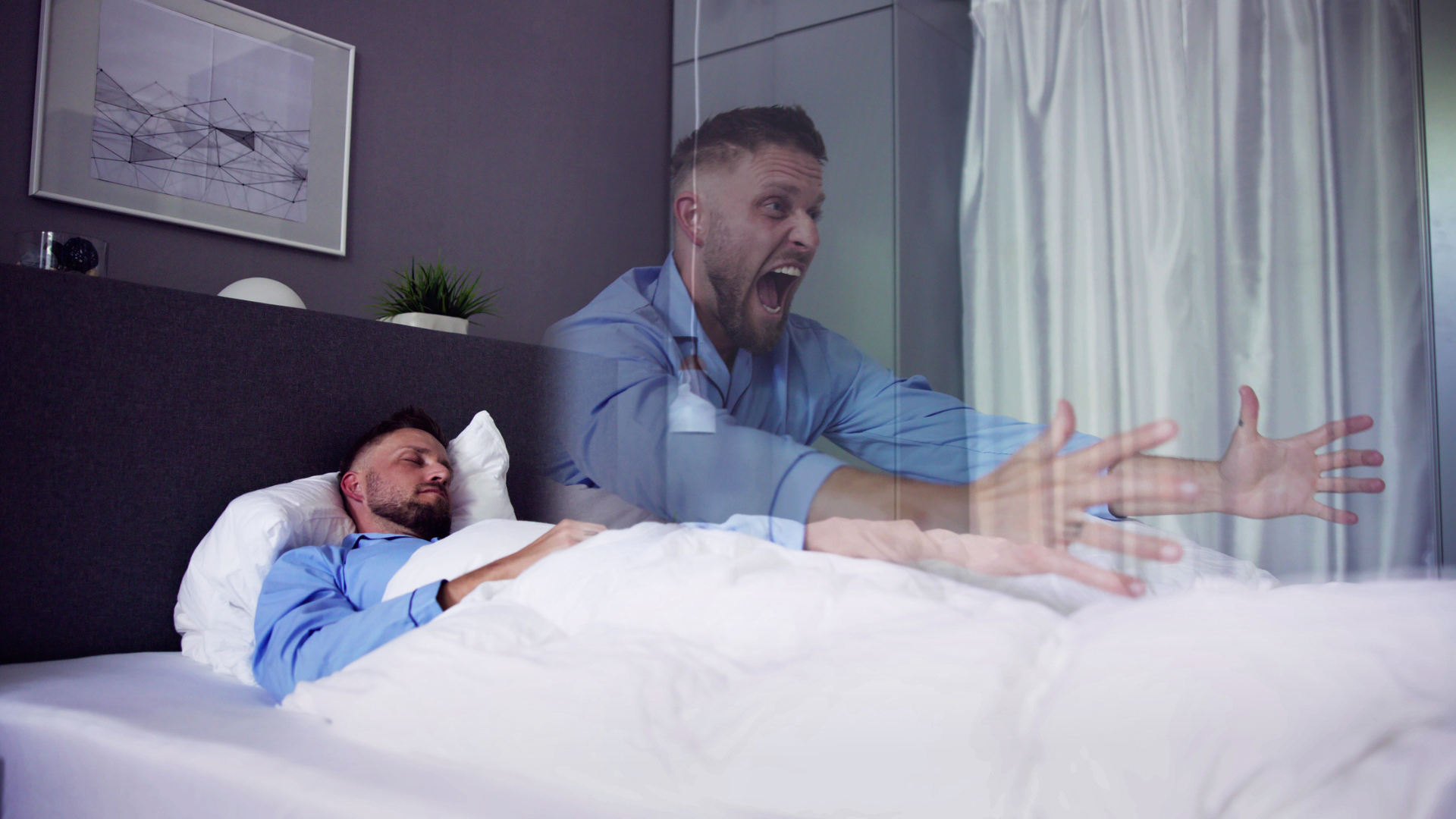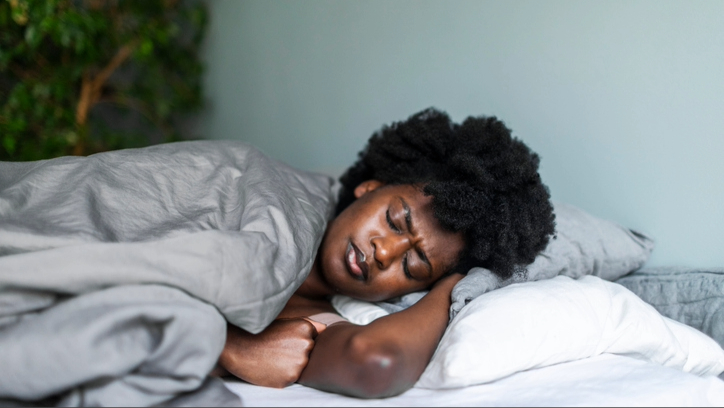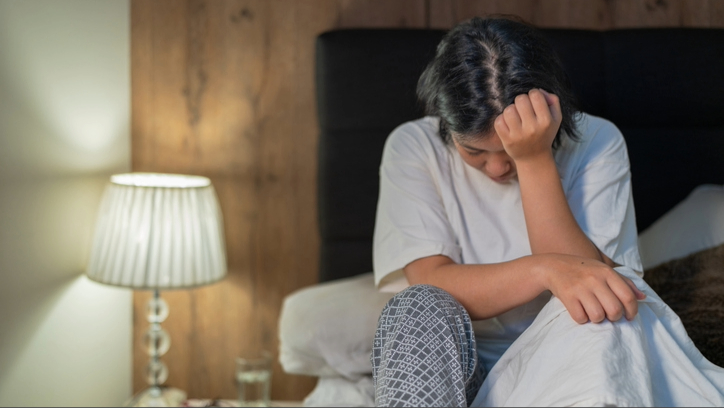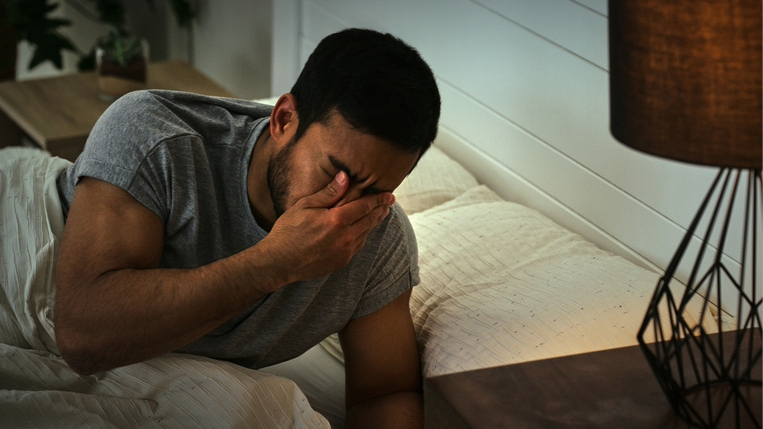Is stress causing my sleep paralysis? We ask a neuroscientist
This Stress Awareness Day, we asked a neuroscientist how to deal with stress-induced sleep paralysis

Have you ever woken up after sleeping, unable to move? Maybe you can see figures or shadows around you, or even hear them, but you can't run away or fight back? This is known as sleep paralysis and anyone who has experienced it will know how terrifying it can be.
While sleep paralysis is generally harmless, it can be a sign of, and caused by, more concerning issues. One cause of the sleep condition is stress, a feeling we're all too familiar with in the modern world.
This Stress Awareness Day, we asked Dr Chelsie Rohrscheib, neuroscientist and head sleep expert at Wesper, how stress can cause sleep paralysis. Plus she shared her tips for preventing sleep paralysis episodes and how to deal with it in the moment.
What is sleep paralysis?
Sleep paralysis is a feeling of being conscious but unable to move or speak right before falling asleep or waking up. It happens when your body is in between stages of sleep and wakefulness, and it could be a sign of stress.
Around 8% of people have recurrent sleep paralysis
Dr Rohrscheib describes sleep paralysis as "a phenomenon" that occurs upon awakening from REM sleep, the stage when we dream. She explains: "During REM, our body is partially paralyzed so we cannot act out our dreams and hurt ourselves. During sleep paralysis, the brain wakes up before the body, which means that the sufferer will not be able to move for seconds or even minutes, though they are fully awake."
Although generally harmless, it can be extremely frightening. When it happens, you may feel like someone is pushing you down or you may experience visual and auditory hallucinations, meaning you see things in your room that aren't there. As you can imagine, or may know, this can be distressing.
3 ways stress can cause sleep paralysis
1. Stress interferes with sleep cycles
Stress causes sleep paralysis by interfering with our natural sleep cycles, which incorporate a balance of REM and deep sleep. Chronic stress can change what Dr Rohrscheib calls our "sleep architecture," meaning the way our brain moves through each sleep stage.
Get instant access to breaking news, the hottest reviews, great deals and helpful tips.
She explains how stress can "lead to increased time spent in REM sleep and changes the way our brain transitions in and out of REM," which increases the risk of a sleep paralysis episode occurring.
2. Stress affects transitions from sleep to wake
It's well known that stress activates our flight or fight response, which increases levels of the stress hormones, cortisol and adrenaline, in the blood. Dr Rohrscheib says: "These chemicals can negatively impact how our brain transitions from wake to sleep and sleep to wake, which plays a role in sleep paralysis."

Sleep paralysis happens when you are just falling asleep or waking up, and an influx of these stress hormones during this time constricts muscles causing immobility.
3. Stress prevents deep sleep
Activating the sympathetic nervous system, stress can negatively impact your ability to sleep well. It can force your mind into overdrive and make you feel restless, making it difficult to relax and drift off to sleep.
And the trouble doesn't stop there, when you are chronically stressed, you might find yourself waking up during the night with worrisome thoughts and have trouble falling back asleep. This disjointed sleep pattern means you won't get the quality rest your body needs, which can increase your chance of experiencing sleep paralysis.
"Stress causes hyperarousal, which means we don't sleep deep enough, and are more prone to awakenings. If we wake up too easily during REM sleep, this increases the chance that our body will remain paralyzed," says Dr Rohrscheib.
4. Poor mental health damages sleep
Stress is associated with and can cause poor mental wellbeing. Mental health disorders or neurological conditions associated with stress, such as post-traumatic stress disorder (PTSD), anxiety and depression, can ruin sleep patterns and increase people's susceptibility to sleep paralysis. Studies show up to 76% of patients diagnosed with PTSD experience at least one sleep paralysis episode in their lifetime.

What else causes sleep paralysis?
Besides stress, there are a number of other causes of sleep paralysis. Certain sleep disorders like narcolepsy, a chronic neurological disorder that causes sudden and uncontrollable episodes of falling asleep, are strongly associated with increased sleep paralysis episodes. Additionally, chronic sleep deprivation or chronically poor sleep quality can induce sleep paralysis as your body won't move through the restorative sleep stages as smoothly.
Studies have also found that using certain drugs or medications like antidepressants can cause sleep paralysis. These medications can cause sleep disturbances as they interact with the neurotransmitters and receptors that control sleep and wake cycles.
Finally, hormonal changes, especially in women going through the menopause, are associated with more episodes of sleep paralysis. This is because hot flushes at night can wake the brain during sleep, putting you in the stage between sleep and wakefulness where sleep paralysis is more likely to occur more often.
How to deal with sleep paralysis
If sleep paralysis is affecting your day-to-day life you should talk with a health professional or doctor to see what they advise for treatment. Otherwise, if you only experience sleep paralysis now and again, the following methods recommended by Dr Rohrscheib can be useful for reducing and dealing with episodes.
1. Practice good sleep hygiene
First and foremost, as sleep paralysis is linked to poor sleep quality, acing your sleep schedule should be a priority. It is important to maintain good sleep habits like keeping your bedroom and mattress clean and conducive to sleep, following a relaxing nighttime routine, getting adequate daylight and movement to regulate your circadian rhythm, and limiting screentime before bed.
Making sure you're sleeping on the best mattress for your body and using the best pillow for your sleeping position will also help you have deeper, more restorative sleep.
Dr Rohrscheib says good sleep hygiene will ensure you get enough sleep for your brain to function properly. You are less likely to experience sleep paralysis when you are well-rested and your body is efficient at recognising signals to sleep.

2. Avoid alcohol
Dr Rohrscheib recommends avoiding alcohol, especially before bed, to avoid sleep paralysis. Excessive alcohol consumption has been linked to sleep paralysis. You might have even noticed that your episodes occur after a boozey weekend.
Alcohol disrupts sleep as it interferes with the production of the sleep-inducing hormone melatonin, disrupts circadian rhythms, increases wakefulness and reduces deep sleep and overall sleep quality.
With alcohol wreaking havoc on your sleep, mind and body functions in so many ways, consumption increases your chance of experiencing sleep paralysis.
3. Train yourself to recognize episodes
Dr Rohrscheib recommends training yourself to recognize episodes of sleep paralysis if they happen more than once so that you feel less scared, distressed or anxious when they do occur. This way you can practice exercises to help you through the episode.
"Train yourself to focus on moving your fingers or toes during an episode, which can help break you out of the paralysis," advises Dr Rohrscheib.
4. Cognitive behavioral therapy
If your sleep is frequently disrupted by sleep paralysis, Dr Rohrscheib advises cognitive behavioral therapy, a type of therapy that focuses on changing the way a person thinks and behaves in order to improve their mental health.
As previously discussed, mental health struggles, especially those revolving around stress, can cause sleep paralysis. Therefore, cognitive behavioral therapy can prevent the distress associated with the episodes.
That said, if you experience chronic sleep paralysis with episodes occurring several times a week or more you should seek professional help.

Who is more likely to suffer from sleep paralysis?
It is not uncommon to experience sleep paralysis once or on multiple occasions during your lifetime, in fact just under 8% of the general population have recurrent sleep paralysis. However, there are factors that make you more susceptible to the sleep problem.
Alongside people who are sleep deprived or have poor sleep habits, who exactly is more likely to experience sleep paralysis? Dr Rohrscheib says shift workers who sleep at odd hours, women going through menopause, people who suffer from mental health conditions like anxiety disorder or PTSD, people with narcolepsy, and those who consume drugs and alcohol are all more likely to experience sleep paralysis.

Eve is a sleep tech product tester and writer at Tom's Guide, covering everything from smart beds and sleep trackers, to sleep earbuds and sunrise alarm clocks. Eve is a PPA-accredited journalist with an MA in Magazine Journalism, and has four years’ experience writing features and news. In her role as Sleep Tech Product Tester and Writer for Tom's Guide, Eve is constantly trying out and reviewing the latest sleep products from brands such as Apple, Garmin, Whoop, Hatch, Sleep Number, Eight Sleep, and Oura. A fitness enthusiast who completed the London Marathon earlier this year, Eve loves exploring the relationship between good sleep, overall health, and physical performance, and how great sleep tech can make that relationship even better.
 Club Benefits
Club Benefits





